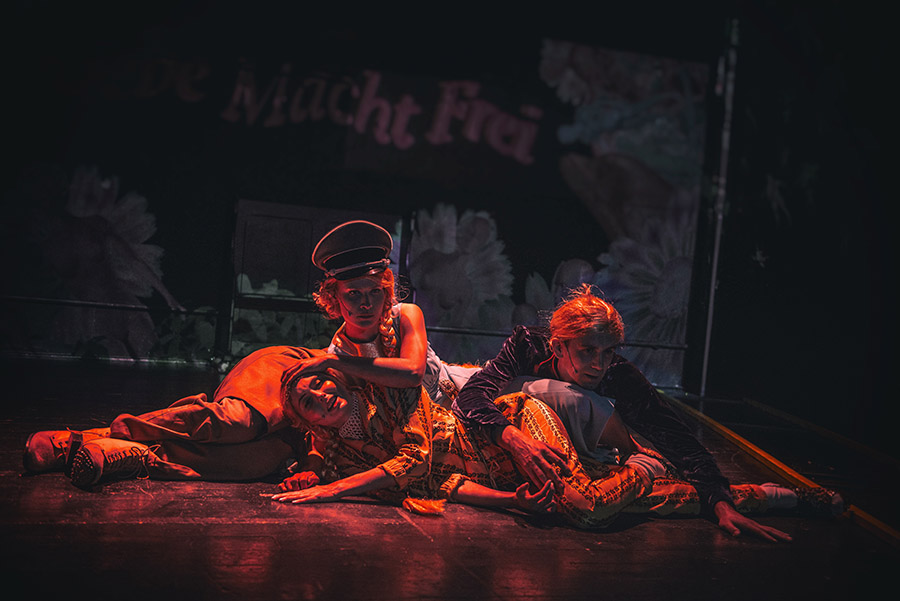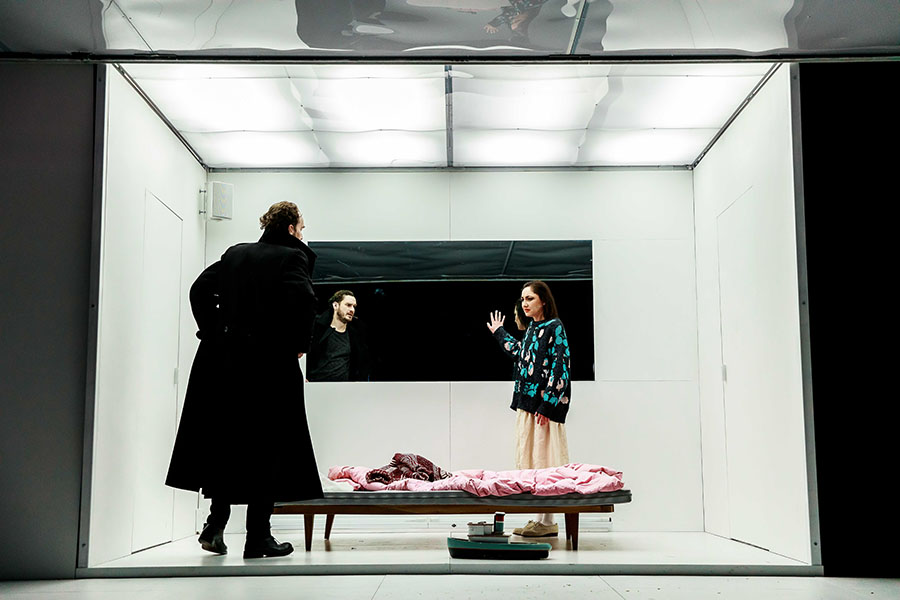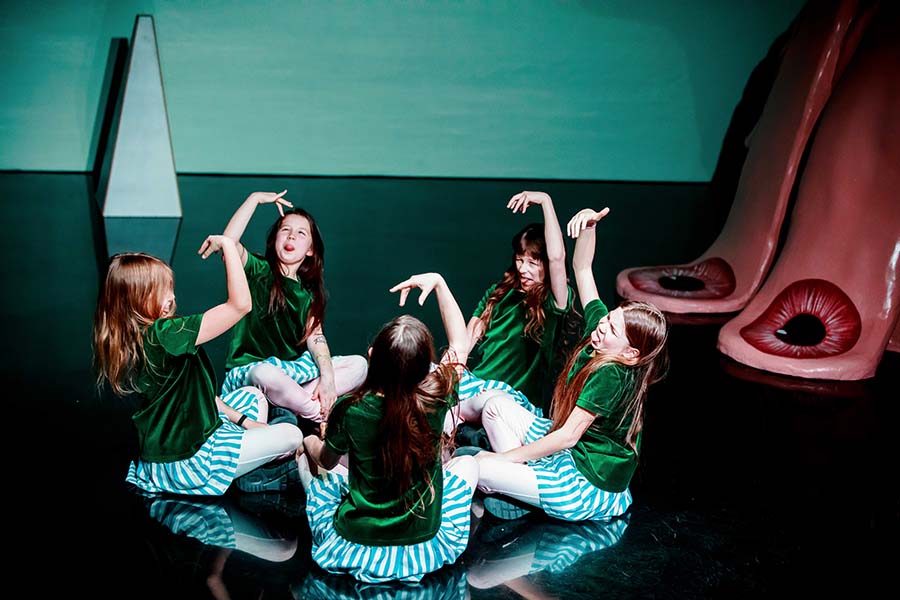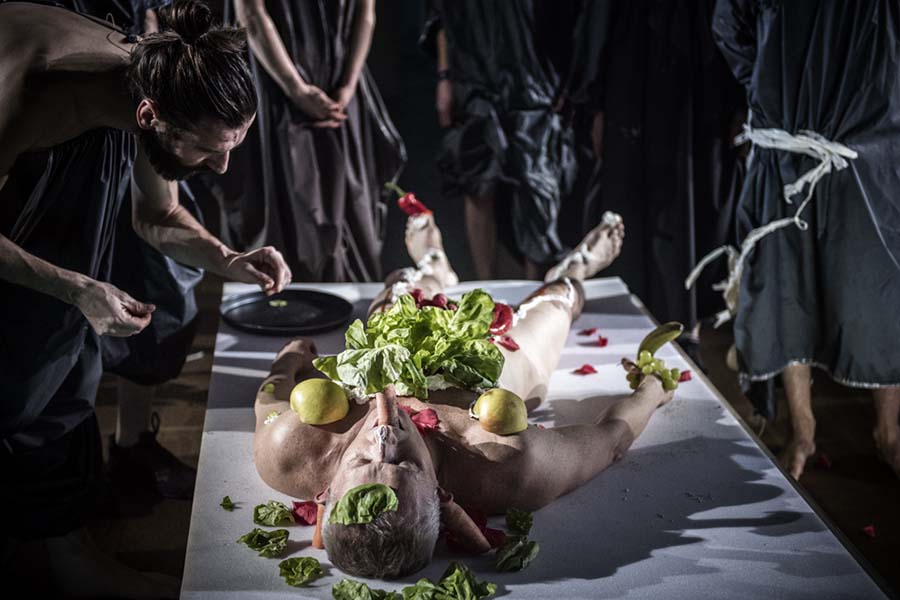“The Poland of today seems increasingly like an ideologically feudal outpost, its politics once again ridden with the legacy of communism, conspiracy theories, and exclusionary discourse towards opponents.” —Natalia Kopytruk, on the Foreign Policy Research Institute blog “Geopoliticus”
On the plane to Warsaw, I brooded over printouts of a dozen or so articles about the current situation in Poland. Their downbeat titles, like “How Democracy Became the Enemy” and “Poland Digs Itself a Memory Hole,” were enough to make me apprehensive about what I was about to cover: a showcase of 11 new theatre productions judged to be the best and most representative works appearing on Polish stages this year, running April 12-14. Given the tense, illiberal tenor of the times, would this festival, Generation After 2, be able to acquit itself in the celebrated tradition of 20th-century Polish performance—a tradition that valorizes truth-telling, resistance to authority, eloquent renunciations of totalitarianism?
Two hours after deplaning, I mingled with a klatch of international journalists and critics on the sidewalk outside TR Warszawa, a major Warsaw company that will soon expand its operations to a larger venue already under construction near the city center. The show we were about to see, Puppenhaus.Treatment, deals with a topic that’s been in the news around the world, and about which I imagine my far-flung colleagues have also been ruminating: the nation’s new “Death Camp” law, successfully pushed through the legislature in February by the ruling Law and Justice Party (abbreviated, notably, as “PiS”), which forbids any accusations of Polish participation in the Holocaust or other war crimes that took place during the German occupation of the country.
Given the prevalent mood of self-righteous nationalism, could a theatre piece—especially one presented by a popular, state-funded company in the throes of expansion—openly defy this anti-media, history-obscuring, reality-evading prohibition on free speech?
Not to worry. Moments after we were in our seats at TR Warszawa’s basement black-box space, a stylishly artificial couple emerged out of a makeshift mountain of foam squares—he wearing a shiny velvet suit and a long blond braid, she a gilded dress and jeweled super-heels—to vividly enact a scathing response to the government’s fresh criminalization of free expression.
“How to remember right? How to remember wrong?” pondered the woman, an addled Auschwitz survivor who confessed that she worked as a prostitute in the camp’s brothel to ensure her survival. Her husband, in such severe denial about her past as “a filthy whore for the SS,” wore a foam-stuffed bag over his head when she spoke. Together, as wartime films and photos flicker ominously on the walls, the pair rolled a swastika-bedecked mini-train car down a track running diagonally through the space; a trio of additional characters soon emerged from the little compartment with their own harrowing accounts, absurdly choreographed and flamboyantly delivered, of war and criminality. As one collaborator declared, staking out a position that might stand in for that of authoritarian Polish legislators, “I can remember the way I want—because I deserve it!”
Young director Jędrzej Plaskowski, who based Puppenhaus.Treatment on a Serbian play about female prisoners in Auschwitz, confirmed to me that “the national and political discourse of today” was the primary impetus for his high-impact “theatrical fantasy about wartime.”
He could be speaking for any of his colleagues featured in this second annual showcase, particularly the five women directors who landed festival slots, marking a remarkable advance in Poland’s male-dominated theatre hierarchy. The festival was launched last year by two Warsaw-based organizations, the internationally focused Adam Mickiewicz Institute and Nowy Teatr, and organizers said they’re particularly interested in the personal artistic expression of young Polish artists at what they see as “a moment of disappointment with the illusions of liberalism and neoliberalism, a time of deep crisis for democracy.”
The strategy worked: One aspect or another of the nation’s problematic present moment was up for examination—and occasionally in for wry or slashing critique—in virtually all of the 11 shows on the festival lineup.

None of the artists in Generation After 2 proved more in tune with her nation’s sociopolitical dilemmas than Natalia Korczakowska, 39, who broke a glass ceiling in 2016 when she ascended to the post of artistic director of the prestigious STUDIO teatrgaleria, housed in a marble-columned complex in Warsaw’s emblematic Parade Square. Korczakowka’s expansive, critically controversial stage treatment of Dostoevsky’s novel Demons (best known to U.S. readers as The Possessed) wasted no time in drawing ominous parallels between Russian history and Poland’s repressive swerve rightward: It opened with an iconic image of Czar Nicholas II and his family, enclosed in a plastic cubicle; a cloud of smoke engulfed them, and one by one they fell to the floor. Voilá: Revolution, the Holocaust, Aleppo, beyond.
“Dostoevsky was trying to discover the boundaries of human behavior,” Korczakowka observed of his novel, set in late-1860s Russia, which she adapted with dramaturg Adam Radeki and staged with a toolbox of frequently dazzling, sometimes puzzling experimental effects. “In this book he came to the knowledge that there is in fact no border at all—there are no limits to how far one can go with his free will, if he is willing to act against his emotions and himself.”
That unsettling theme, which Korczakowka sees as a recipe for “totalitarianism and misery,” was embodied by Demons’ central character Nikolai Stavrogin, the dashing, driven and tormented criminal whose fate is viewed from multiple perspectives (and in intimate video closeups via projections splayed on peripheral screens or revolving set pieces) in the director’s pared-down but relentless narrative. Daringly, she zeroed in on an episode from a chapter originally censored from the book, in which Stavrogin—freed from moral constraints by the conviction that “there is neither good nor evil”—confesses in morbid detail to raping and driving to suicide an 11-year-old girl.
“I’m trying to sound some kind of alarm—that we should be very careful not to let ideas possess our brains or our souls,” declared Korczakowka, whose résumé sports such provocative entries as a Lost Highway opera, based on David Lynch’s cult film and with a libretto by Nobel-winner Elfriede Jelienek, and a landmark stage rendition of Berlin Alexanderplatz. “Ideas are demons—we cannot let them become intelligence tools, or cause us to lose a relationship with reality, so we don’t know what we are doing,” she contended, referring to her plunge into Dostoevsky’s dark psychological treatise as “a cautionary tale.”
Indeed, caution can be a virtue these days in Poland’s arts and culture scene, which has been besieged in recent seasons on multiple fronts. At a panel discussion at Korczakowska’s venue, theatre folk recounted problems they’ve faced—the firing of employees, radical diminution of audiences, draconian funding cuts, actual incidences of violence—because of the authorities and organized opposition groups. Religion, in staunchly Roman Catholic Poland, is the anti-theatrical right’s trigger of choice.
As far back as 2013, at the National Stary Theatre in Kraków, a production of To Damascus—based on a Strindberg-inspired text about an artist’s search for God, and directed by Stary’s much-lauded A.D. Jan Klata—was disrupted by whistles and boos from a cluster of older spectators dispatched to the theatre by a right-wing newspaper; their shouts of “Disgrace!”, amplified by an aggressive internet campaign to blow the event out of proportion, soon became a catchphrase for anti-arts protesters across the country. Actress Dorota Segda, who appeared in the production, spoke movingly about the debilitating effect on her career of being labeled a “left-wing Marxist artist.”
Another production—Teatr Powszechny of Warsaw’s wildly popular The Curse, which raised religious hackles by condemning Polish authorities for failing to respond to allegations of child abuse by members of the Catholic clergy—is currently under investigation by state prosecutors for (believe it or not) “inciting the audience to murder.” (An actor in one scene considered the hypothetical legality of raising money to pay for the assassination of PiS leader Jarosław Kaczyński.)
Still running and about to go on national tour, The Curse became the target of violent protests after it was illegally recorded and misleading excerpts were broadcast on television with inflammatory commentary. Last May the theatre was besieged by 1,500 demonstrators who tried to break into the building, set off smoke grenades and flares, and roughed up employees. Despite the efforts of a team of retired counter-intelligence officials called in to help, a subsequent demo sent three Powszechny employees and once audience member to the hospital.
Rather than blaming city authorities, who did not side with the protesters and attempted to provide protection, the producers of The Curse have accused Poland’s state-controlled media of deliberately whipping up public anger against the theatre. All the same, as one panelist ventured with an ironic shrug, “The chief culprit here is the Ministry of Culture”—the very agency that represents and funds the nation’s theatres.

A cluster of smaller-scale productions focused festivalgoers’ attention on social issues like gender stereotypes and racial injustice. Director Małgorzata Wdowik’s Girls, performed in an upstairs white-box space at STUDIO teatrgaleria by an improvisatory sextet of 8- to 15-year-olds (plus one initially comatose adult woman), explored clichés and preconceptions about the adolescent female body, to refreshing effect. Sharing the stage with a pink-molded igloo mound, vaguely resembling a giant breast, the exuberant team—all in identical green tops and short striped skirts, all sporting long, straight hair—gyrated to rock music, ran through a repertoire of gestures, murmured the phrase “I do not know,” and plopped down in a communal circle to breathe in unison. When an apparently unconscious woman was discovered in the igloo, her body became a doll to play with, the girls eagerly manipulating her hands, arms, and feet, rolling her over, spanking, inspecting, and tickling her until—finally, a response! Come to life, the woman acted as an interlocutor, letting the audience in on the girls’ whispered remarks about audience members they picked out to scrutinize (“That guy hasn’t laughed once since the show started!”).
What was Wdowik after? It’s revealing to learn that Girls was a follow-up to a piece she made with football players about the idealization of the masculine body; when questions ensued about femininity, the director reset her time frame. “It’s at 6 or 7 that we begin having sexual feelings, which is the most natural thing—but if we’re not allowed to express them, that can damage kids,” she posited. Because the timing was right, Wdowik took her young cast to last year’s massive women’s protest march, a response to PiS’s attempt to roll back abortion rights (it failed), and is considering a performance series that will follow her six actresses as they mature, a la Michael Apted’s Up documentaries.
It was men’s bodies and minds that got the once-over in Cezary Goes to War, a wryly comic autobiographical meditation by director/choreographer Cezary Tomaszewki on the rigors of Poland’s military induction system. To the strains of Handel’s Xerxes and Debussy’s Prelude to the Afternoon of a Faun, four guys and a girl, all playing the role of “Cezary,” lined up on a bare stage, stripped to black briefs and socks, and gamely endured a recorded grilling by the Regional Medical Draft Board of Warsaw: Diameter of biceps? Percentage of body fat? Disfiguring tattoos? Crossed eyes? Psychological deficiencies? Sexual deviancy? Patriotism and love of homeland?
These vulnerable but athletic stand-ins for Cezary give the imaginary conscription committee their best shot, belting out songs about knights and soldiers while turning cartwheels, channeling balletic moves of Nijinsky, executing synchronized wiggles while flat on their backs. “Which one of them is the real Cezary?” I asked the fellow next to me after the show. “The tall one,” he answered matter-of-factly. That must have been a Polish joke, I realized when I met the real Tomaszewski, an amenable 41-year-old polymath with wide-ranging credits in the music and dance world, the following day.
Identity-sharing and the nature of heroism were also key elements in a festival entry with direct U.S. connections—director Anna Smolar’s exuberant revue-style Henrietta Lacks, named for the terminally ill 31-year-old African-American cancer patient from Baltimore whose uterine cells were collected for scientific experimentation in 1951, resulting in medical breakthroughs in human longevity, cloning, and cures for deadly diseases. Smolar used this American medical scandal—the discoveries never benefited Lacks herself or her five orphaned children, and the secret was kept under wraps for decades—as improbable fodder for an exuberant vaudeville, executed by a quartet of transformative actors, two men, two women, in tap shoes. Yes—tap shoes.
Playing characters like the empathetic Mr. Cancer, Dolly the famous cloned sheep, and Dr. Ian Wilmut (Dolly’s creator, who paved the way for new research into Parkinson’s, and was diagnosed himself with the disease, according to news reports, just last month at age 73), the winningly versatile actors punctuated the show’s tale of medical injustice with brassy solo and group tap routines, a trope with no apparent connection to the subject at hand but that nevertheless elicited cheers from the house. One fantasy segment reinvented the Lacks affair in Polish terms (“Meet Henryka Lackska, wronged Polish citizen”), ostensibly to make a point about homegrown racism. Smolar, a Polish-French director with a literary degree from the Sorbonne and her own company back in Paris, won a 2016 “Passport” award for her “intimate and empathetic theatre…dealing with issues banished to the margins,” an apt accolade for Henrietta Lacks.
Anna Karasińska, a 40-year-old director, filmmaker and playwright whose festival entry was a deadpan exercise in minimalist metatheatre called The Fantasia, clearly shares her colleague Smolar’s fascination with the imaginative limits of the stage. Perched invisibly in the rear balcony with a microphone, Karasińska herself issued individual acting instructions to the three men and three women in her cast, then paused to allow the audience to savor the actors’ transformations, or lack thereof: “Agata, you see a person in a hoodie standing across the street who you sort of recognize.” “Rafal, you are someone who pees in the pool.“ “Zofia, you are a person who blacks out actors’ teeth on theatre posters.” The responses from the stage, which ranged from pokerfaced blankness to the occasional fierce outburst, commanded the audience’s attention with surprising force, and, despite the tongue-in-cheek setup, seemed to imbue the discipline of acting with a fresh, even profound, edginess.

Banished inhibitions and spectacular stagecraft were the watchwords of two final productions considered here, both mounted in cavernous warehouse spaces for the delectation of audiences willing to peruse theatrical vistas not usually exposed. The first, TR Warszawa’s sprawling four-hour tome My Struggle, directed by Michał Borczuch and adapted (by Tomasz Śpiewak) from Scandanavian author Karl Ove Knausgărd’s best-selling, 3,600-page series of novels, was spooled out in a 180-degree vista adorned with film screens, tattered furniture, out-of-sight cul-de-sacs, and, at stage right, a watchful, giant plaster owl with gleaming eyes. The tale of a tragedy-prone family whose patriarch has just died, leaving the family homestead in a state of smelly decay, spilled erratically into the redolent space; Borczuch, whose influences include filmmakers Pier Paolo Pasolini and Pedro Amaldovar, said he sees My Struggle as “a modern algorithm for preserving reality and ourselves within it.”
More easily accessible to most theatregoers was director and visual artist Krzystof Garbaczewski’s Symposium, a passionate, no-holds-barred riff on Plato’s philosophical treatise and his love of Eros, mounted in a metal-walled Nowy Teatr space not quite so cavernous as the room that swallowed up My Struggle. A multi-level mountain of wooden boxes dominated the abstract environment, in which the Greek philosopher’s circle of acolytes and detractors—the voluble Sophocles included—gathered for rambunctious socializing and, eventually, weightier matters.
Garbaczewski is a classicist (known for his offbeat takes on Hamlet, The Tempest, Homer’s Odyssey, and his own 2010 arm-wrestle with Dostoevsky’s Demons) and a stylist par excellence—his earringed Plato wore a man-bun and a draped gown, in ironic contrast to lead actor Jacek Poniedziałek’s stolidly macho Socrates. Among his formal gambits in Symposium, the director included a back-up switch: Whenever the play seemed to fly off the rails, he flipped the action back to the moment of takeoff.
Garbaczewski conducted his Symposium without an organized syllabus. Early on, a call to the heavens from Sophocles’s unstable consort Phaedrus for the intervention of Eros prompted a magical battle between an animated pair of wooden set pieces, one equipped with a symbolic penis, the other with twirling wooden breasts. Mentions of Brad Pitt and Coca-Cola found their way into the high-flown discourse, and before you could say “Brad Pitt?”, a deranged, raving Phaedrus began stalking the stage with a pistol, assassinating the subjects of her tirade. Off the rails? Click, rewind, start again.
In a subsequent take, film projections transformed the wood-hued set into a kind of kinetic wonderland, where Plato hid and pleasured himself to the sounds of supernatural erotica; the voice of Eros herself proclaimed in sci-fi tones, “Everyone I touch becomes a great and famous artist—those I do not touch die in darkness!” Click, rewind.
Once the pliable plot took its inevitable turn toward Socrates’s trial, on charges of inventing new deities and corrupting the youth of Athens, there was no turning back: Stark naked, the defendant delivered his famous apology directly to the audience in an unruffled but riveting half-hour soliloquy—a scene that exploited actor Poniedzialek’s star power with precision—then proceeded to drink poison from a pop-top Coke can. His bare body, laid out on a gurney, was promptly decorated by his devotees with an abundance of fruit and veggie crudités that we spectators were invited to come forward and munch on like party treats.
Aside from the power of theatrical audacity to help us see the familiar with fresh eyes, what is Garbaczewski telegraphing in his culinary finale to Socrates’s career? Perhaps something like this: If, as Dostoevsky contends, ideas are demons, they are also nourishment that can forge collective bonds and reinvigorate human connectivity. Contemporary reality, in Poland and elsewhere, has flown off the rails. Click, rewind. Start again.
Jim O’Quinn, the founding editor of American Theatre magazine, now lives and works in New Orleans. His visit to Generation After 2 was supported in part by the Adam Mickiewicz Institute.


